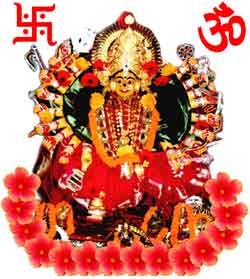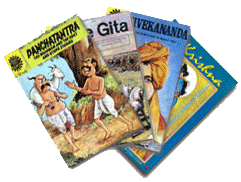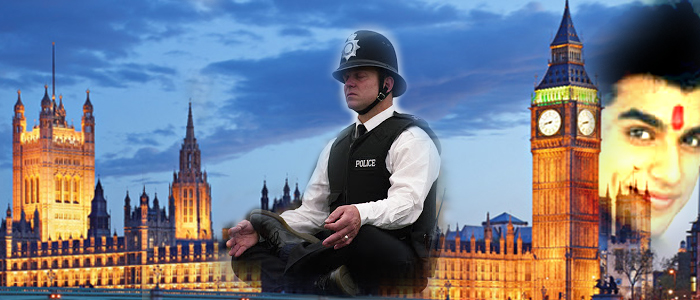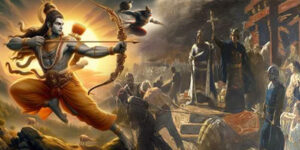 The family Deity of the maternal side of my family is Ma Mangalchandi and my paternal side is devoted of Lord Narasingha. My parents’ common names were Nimu (one of the names of Lord Shiva) and Shankari, (one of the names for Goddess Parvati). Some of the ritualistic elements in my family have a Buddhist tinge as well.
The family Deity of the maternal side of my family is Ma Mangalchandi and my paternal side is devoted of Lord Narasingha. My parents’ common names were Nimu (one of the names of Lord Shiva) and Shankari, (one of the names for Goddess Parvati). Some of the ritualistic elements in my family have a Buddhist tinge as well.
As such it can be said that I was born into a mainstream Hindu family. Moreover my parents gave birth to me, their first child, quite late into their marriage, and as I have been told, after much prayer. Thus, euphemism aside, it can be said that I was born with the blessing of Gods!
All this should have been sufficient to ensure that I grew up as a proud practicing Hindu. But what was a detriment to me being a young Hindu was the fact that I was born in India!! This may sound surprising to some, but the fact is that India, the very land that has been almost synonymous with Hinduism and nourished by it for eons is perhaps the worst non-Islamic nation to be a Hindu! The tragedy haunts and the irony blinds.
Most nations teach their children to have an identity rooted in the history and the culture of the land, to the extent of sometimes over-glorifying it, so its people may have some sort of pride and cohesiveness. However ‘modern’ India seems to have swung the pendulum to the other extreme.
Most of its leaders reside in a constant state of denial about their ancient heritage and its “intellectual” elites have embarked on a quest to not only negate all the achievement and contributions of Hinduism but also to inflate all the alien ideologies that have sought to destroy her. All the history books are altered and school curriculum doctored, so that the children of India grow up to espouse only India, but never Hinduism.
Hinduism is taught as some outdated thing of the past, that has little place amongst ‘moderns’. I too spent my pre-teen years and a considerable part of my teens with such a sense of geographical and tribal Indian patriotism, all the while being in complete ignorance about its soul – Hinduism.
My father worked in the Ministry of External Affairs and as such he was transferred out of India to Indonesia, the world’s largest Islamic country. I went to an international school, where there was a very limited curriculum about India or Hinduism. However this was probably better than my friends in India who were being systematically taught to see Hinduism as nothing more than a relic from the past.
I n any case the Hinduism within me lay dormant and even managed to see a few rays of light in the regular pujas done in my house or the Amar Chitra Katha comic books in my school library. Yet I was not yet a Hindu by heart, only one by ethnicity. And so passed my pre-teens and early teens till my father’s was ordered to return to India.
n any case the Hinduism within me lay dormant and even managed to see a few rays of light in the regular pujas done in my house or the Amar Chitra Katha comic books in my school library. Yet I was not yet a Hindu by heart, only one by ethnicity. And so passed my pre-teens and early teens till my father’s was ordered to return to India.
By this time I was in the mid teens and my hormonal activity was nearing its peak. Inevitably, I was starting to take an increasing interest in the opposite sex. I found my generation of ethnic Hindus in India as being increasingly enamored by the corporate and hedonistic aspect of Western culture, owing to ongoing media conditioning. Having been educated in an international school and being known to have had an exposure to the mythical Western utopia I was ahead of the game.
However I needed to preserve my distinctiveness and it occurred to me that the best way to remain unique was to become a practicing Hindoo (the colonial epithet of Hindu). And as it turned out I was right, as due to my ‘charade’ I happened to be the only one who in spite of being “westernized”, seemed to portray “Hindooness”. For the next few years Hinduism started to bathe my body, though not diffusing into my soul.
 Time passed – I finished school. My father moved the flock to a new country once again, this time to London – the erstwhile centre of British imperialism! The clock had struck “eight-teen”, I had enrolled in university, gotten myself a part-time job, and the crème de la crème of assertion of independence (from what I wonder now), moved out of my parent’s house.
Time passed – I finished school. My father moved the flock to a new country once again, this time to London – the erstwhile centre of British imperialism! The clock had struck “eight-teen”, I had enrolled in university, gotten myself a part-time job, and the crème de la crème of assertion of independence (from what I wonder now), moved out of my parent’s house.
As it turned out the intellectual environment in freethinking British society was much more conducive to my spiritual progress than that of the as-yet mentally colonised urban Indian one. This was a place where there was a sufficient Hindu presence, untainted by the systematic defamation. This was not to say that the distortions and misconceptions that had infested Hinduism were not prevalent in UK.
But at least the Government was not hostile to the Hinduism; in fact some of the allowances that the British government had made to enable Hindu expression in public life would have been considered heresy to secular Indians.
A definitive incident for me was the arrival of my cousin to London from Bangladesh. As a Hindu in Bangladesh my cousin has had a perilous and victimized childhood, as does every other Hindu living in Bangladesh – rich or poor. Living under such dark shadows, my cousin was acutely aware of the historical struggle that Hindus have had to go through for survival and the harsh realities that they face.
 When he found me so completely ignorant of both history and current affairs, he took the initiative to keep me informed. Being introduced to the correct information really set things in the right perspective and got me thinking of what Hindus in Bangladesh are currently having to endure just to be able to remain Hindus in their own ancestral homes. My life concerns seemed so small compared to their sufferings.
When he found me so completely ignorant of both history and current affairs, he took the initiative to keep me informed. Being introduced to the correct information really set things in the right perspective and got me thinking of what Hindus in Bangladesh are currently having to endure just to be able to remain Hindus in their own ancestral homes. My life concerns seemed so small compared to their sufferings.
My cousin was also a practicing Hindu (the first one I had met of my generation) and being familiar with Its great philosophical and spiritual teachings, my cousin would encourage me to think for myself and contemplate on the world. He even managed to get me reading for the first time in years. I don’t claim that these activities were anything exclusively Hindu, but they embodied the Hindu spirit of freethinking, enquiry and Truth seeking.
Yet another seemingly benign, but retrospectively rather important factor in my journey was the occasional visit to the British Museum. Being there, standing amongst the relics of all these sister civilisations of Hinduism, it dawned on me that Hinduism had survived where many other religions and civilisations had perished and that Hinduism remained as the sole preserved Pagan religion.
All these other ancient religions, such as that of the ancient Egyptians and Greeks existed now only on the shelves of such museums. While it made me optimistic with the thought that Hinduism must have some great survival quality to have escaped the same fate, it also made me sad to see the great Gods and Goddesses of ancient civilisations as if they were in a petting zoo.
They belonged in great temples and ought be revered and worshipped, just as the Gods and Goddesses of Hindus are. Seeing this benefited me in my spiritual progress. All the “mundane” pujas and rituals that had been performed in my house started to take a whole new meaning. Slowly the pages of my destiny were unfolding
The most definitive incident that was to have a lasting influence on my life was to meet – through a series of incidences starting with a conference on the tragic human rights situation for Hindus and other non-Muslims in Bangladesh – a group of young British Hindus called Hindu Human Rights.
 This group was formed upon the realization of the complete disinterestedness of all the other human rights groups to highlight any atrocities against Hindus, be it their plight in Fiji and Trinidad, their extermination by the ex-Taliban regime in Afghanistan, the massacres by the Maoists in Nepal, the continuing pogroms in Bangladesh, their cleansing in Pakistan and even within the Indian state of Kashmir, not to mention the frequent defamation of Hinduism and Hindu symbolism all over the world.
This group was formed upon the realization of the complete disinterestedness of all the other human rights groups to highlight any atrocities against Hindus, be it their plight in Fiji and Trinidad, their extermination by the ex-Taliban regime in Afghanistan, the massacres by the Maoists in Nepal, the continuing pogroms in Bangladesh, their cleansing in Pakistan and even within the Indian state of Kashmir, not to mention the frequent defamation of Hinduism and Hindu symbolism all over the world.
The individuals in this group showed a state of consciousness and a level of awareness about contemporary issues concerning Hindus and Hinduism that I had never seen before. Moreover they were just ordinary people like me; they had families, studied, went to University, had jobs. But they embodied the Hinduism of old and presented it as new.
It was in their company that I underwent the final stages of my deconditioning. A great boon to this effect was to come across the works of great writers like Ram Swarup, Sita Ram Goel, David Frawley and Koenraad Elst. I finally began to see Hinduism through Hindu eyes and wake up to my ancestral heritage. I could no longer resist the call of Dharma. I became a Hindu. And it only took travelling over 5000 miles and across two continents to reach destination Dharma.
So this is the story of how I became a Hindu. Dharma cannot be confined by space, time or geographical/political boundaries. As a great man had once said “It is the heritage of all mankind, as proved by the seers, sages and mystics of many a time and clime”. Why did I need to come all the way to London to become a Hindu? Is it because neo-India has forgotten to appreciate its greatest treasure – Hinduism? Or is it because Britain is starting to appreciate that which it has neglected and ridiculed so long?
Maybe its because the Eternal Laws of Dharma operate on a much greater cosmic level and we mere mortals all have a crucial part to play in it. As such it is important that those of us who are fortunate enough to regain our Hindu consciousness should relay our experiences onto others. In today’s world it no longer seems sufficient to be simply born in a Hindoo house or have a Hindoo sounding name to be Hindu. But for all else, we should remember that The Great Mother is always there, beckoning her children to come and sit in her lap, free from fear. So eventually Dharma shall prevail.






























